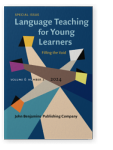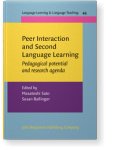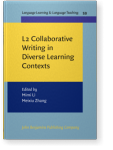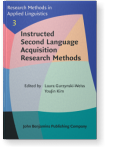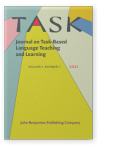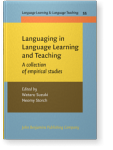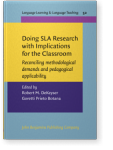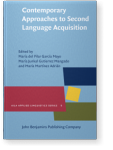Masatoshi Sato
List of John Benjamins publications for which Masatoshi Sato plays a role.
Journal
Title
Peer Interaction and Second Language Learning: Pedagogical potential and research agenda
Edited by Masatoshi Sato and Susan Ballinger
[Language Learning & Language Teaching, 45] 2016. vii, 399 pp.
Subjects Applied linguistics | Language acquisition | Language teaching | Sociolinguistics and Dialectology
2023 Chapter 2. Metacognitive approaches to collaborative writing: Theoretical and pedagogical proposals L2 Collaborative Writing in Diverse Learning Contexts, Li, Mimi and Meixiu Zhang (eds.), pp. 32–52 | Chapter
Collaborative writing (CW) presents unique L2 learning opportunities. While previous research primarily used cognitive and social approaches, the current chapter proposes a metacognitive approach to (1) advance our understanding of how CW supports L2 learning, and (2) explore pedagogical ideas… read more
2022 Chapter 4. Mixed methods research in ISLA Instructed Second Language Acquisition Research Methods, Gurzynski-Weiss, Laura and YouJin Kim (eds.), pp. 79–102 | Chapter
This chapter explores the potential of mixed methods research (MMR) for conducting robust ISLA research to understand complex second language (L2) learning phenomena in instructed settings. MMR provides researchers with a pragmatic framework to answer research questions by mixing quantitative… read more
2021 Exploring the relationship between TBLT and ISLA TASK 1:1, pp. 47–70 | Article
The relationship between task-based language teaching (TBLT) and instructed second language acquisition (ISLA) is a close one. Both are concerned primarily with facilitating the development of second language (L2) learners’ linguistic proficiency. This article begins by providing a brief… read more
2020 Chapter 2. The role of L1 use by high-proficiency learners in L2 vocabulary development: A quasi-experimental study of L1 languaging Languaging in Language Learning and Teaching: A collection of empirical studies, Suzuki, Wataru and Neomy Storch (eds.), pp. 41–66 | Chapter
This study investigated second language (L2) learners’ use of first language (L1) as a means to resolve lexical issues during collaborative writing tasks (i.e., L1 languaging). Participants were 34 8th grade high-proficiency English learners in Chile who shared their L1 (Spanish). Their… read more
2019 Chapter 3. Methodological strengths, challenges, and joys of classroom-based quasi-experimental research: Metacognitive instruction and corrective feedback Doing SLA Research with Implications for the Classroom: Reconciling methodological demands and pedagogical applicability, DeKeyser, Robert M. and Goretti Prieto Botana (eds.), pp. 31–54 | Chapter
This chapter reports on a classroom-based quasi-experimental study by focusing on its methodological aspects. The study’s objectives were twofold: (1) to examine the effect of metacognitive instruction (MI) in which learners were instructed about the benefits of receiving corrective feedback (CF),… read more
2016 3. Interaction or collaboration? Group dynamics in the foreign language classroom Peer Interaction and Second Language Learning: Pedagogical potential and research agenda, Sato, Masatoshi and Susan Ballinger (eds.), pp. 91–112 | Article
This chapter reports on a classroom-based quasi-experimental study examining the relationship between interactional moves and collaborative patterns in peer interaction and their effect on L2 development, using proficiency as an independent variable. Participants were from two parallel Grade 10… read more
2016 Understanding peer interaction: Research synthesis and directions Peer Interaction and Second Language Learning: Pedagogical potential and research agenda, Sato, Masatoshi and Susan Ballinger (eds.), pp. 1–30 | Article
2013 Chapter 4. Skill Acquisition Theory and the role of practice in L2 development Contemporary Approaches to Second Language Acquisition, García Mayo, María del Pilar, María Juncal Gutiérrez Mangado and María Martínez-Adrián (eds.), pp. 71–92 | Chapter
This chapter presents an overview of research in support of Skill Acquisition Theory and the claim that contextualized oral practice in conjunction with feedback promotes continued second language growth. Skill acquisition is explained as a gradual transition from effortful use to more automatic… read more
